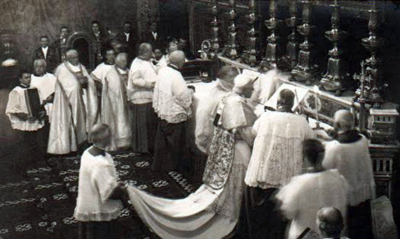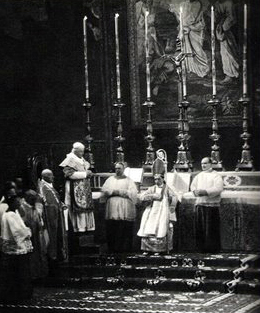

Pope Saint Pius X offering Mass on the 50th Anniversary of His Ordination.
Prayer is man's richest boon. It is his light, his nourishment, and his very life, for it brings him into communication with God, Who is Light, Nourishment, and Life. But of ourselves we know not what we should pray for as we ought (Rom. 8: 26); we must needs, therefore, address ourselves to Jesus Christ, and say to Him as the Apostles did: "Lord, teach us how to pray" (Luke 11: 1). He alone can make the dumb speak, and give eloquence to the mouths of children; and this prodigy He effects by sending His Spirit of grace and of prayers (Zach. 14: 6), Who delights in helping our infirmity, asking for us with unspeakable groanings.
Now it is in the Holy Church that this Divine Spirit dwells. He came down to Her as an impetuous wind, and manifested Himself to Her under the expressive symbol of tongues of fire. Ever since that day of Pentecost, He has dwelt in this His favored Bride. He is the principle of everything that is in Her. He it is that prompts Her prayers, Her desires, Her canticles of praise, Her enthusiasm, and even Her mourning. Hence Her prayer is as uninterrupted as Her existence. Day and night is Her voice sounding sweetly in the ear of Her Divine Spouse, and Her words are ever finding a welcome in His Heart.
At one time, under the impulse of that Spirit, Who animated the admirable psalmist and the prophets, She takes the subject of Her canticles from the Books of the Old Testament; at another, showing Herself to be the Daughter and Sister of the holy Apostles, She intones the canticles written in the Books of the New Covenant; and finally, remembering that She, too, has had given to Her the trumpet and harp, She at times gives way to the Spirit Who animates Her, and sings Her own new canticle. From these three sources comes the divine element which we call the Liturgy.
The prayer of the Church is, therefore, the most pleasing to the ear and Heart of God, and therefore the most efficacious of prayers. Happy then, is he who prays with the Church, and unites his own petitions with those of this Bride, who is so dear to Her Lord that He gives Her all She asks. It is for this reason that our Blessed Savior taught us to say Our Father, and not my Father; give us, forgive us, deliver us, and not give me, forgive me, deliver me. Hence we find that, for upwards of a thousand years, the Church, who prays in Her temples seven times in the day and once again during the night, did not pray alone. The people kept Her company, and fed themselves with delight on the manna which is hidden under the words and mysteries of the divine Liturgy. Thus initiated into the sacred cycle of the mysteries of the Christian year, the faithful, attentive to the teachings of the Spirit, came to know the secrets of eternal life; and, without any further preparation, a Christian was not infrequently chosen by the bishops to be a priest, or even a bishop, that he might go and pour out on the people the treasures of wisdom and love, which he had drunk in at the fountain-head.
For whilst prayer said in union with the Church is the light of the understanding, it is the fire of divine love for the heart. The Christian soul neither needs nor wishes to avoid the company of the Church, when she would converse with God, and praise His greatness and His mercy. She knows that the company of the Bride of Christ could not be a distraction to Her. Is not the Soul Herself a part of this Church, which is the Bride? Has not Jesus Christ said: "Father, may they be one, as We also are One" (John 17: 11)? And, when many are gathered in His Name, does not this same Savior assure us that He is in the midst of them (Matt. 18: 20)? The soul, therefore, may converse freely with her God, Who tells her that He is so near her; she may sing praise, as David did, in the sight of the angels (Ps. 137: 1), whose eternal prayer blends with the prayer which the Church utters in time.

Pope Saint Pius X consecrating the future Pope Benedict XV.
But now for many ages past, Christians have grown too solicitous about earthly things to frequent the holy vigils, and the mystical Hours of the day. Long before the rationalism of the sixteenth century had become the auxiliary of the heresies of that period by curtailing the solemnity of the divine service, the people had ceased to unite themselves exteriorly with the prayer of the Church, except on Sundays and festivals. During the rest of the year, the solemn and imposing grandeur of the Liturgy was gone through, and the people took no share in it. Each new generation increased in indifference for that which their forefathers in the Faith had loved as their best and strongest food. Social prayer was made to give way to individual devotion. Chanting, which is the natural expression of the prayers and even of the sorrows of the Church, became limited to the solemn feasts. That was the first sad revolution in the Christian world.
But even then Christendom was still rich in churches and monasteries; and there, day and night, was still heard the sound of the same venerable prayers which the Church had used through all the past ages. So many hands lifted up to God drew down upon the earth the dew of Heaven, averted storms, and won victory for those who were in battle. These servants of God, who thus kept up an untiring choir that sang the divine praises, were considered as solemnly deputed by the people, which was still Catholic, to pay the full tribute of homage and thanksgiving due to God, His Blessed Mother, and the Saints. These prayers formed a treasury which belonged to all. The faithful gladly united themselves in spirit to what was done. When any affliction, or the desire to obtain a special favor, led them to the House of God, they were sure to hear, no matter at what hour they went, that untiring voice of prayer which was forever ascending to Heaven for the salvation of mankind. At times they would give up their worldly business and cares, and take part in the Office of the Church, and all still understood, at least in a general way, the mysteries of the Liturgy.
Then came the so-called "reformation," and at the outset it attacked the very life of Christianity: it strove to put an end to man's sacrifice of praise to God. It strewed many countries with the ruins of churches: the clergy, the monks, and virgins consecrated to God were banished or put to death; and in the churches which were spared the Divine Offices were not permitted. In other countries, where the persecution was not so violent, many sanctuaries were devastated and irremediably ruined, so that the life and voice of prayer grew faint. Faith, too, was weakened; rationalism became fearfully developed; and now our own age seems threatened with what is the result of these evils—the subversion of all social order.
For when the "reformation" had abated the violence of its persecution, it had other weapons wherewith to attack the Church. By these several countries which continued to be Catholic were infected with that spirit of pride which is the enemy of prayer. The modern spirit would have it that prayer is not action; as though every good action done by man were not a gift of God: a gift which implies two prayers, one of petition that it may be granted, and another of thanksgiving because it is granted. There were found men who said: "Let us abolish all the festival days of God from the earth" (Ps. 73: 8); and then came upon us that calamity which brings all others with it, and which the good Mordochai besought God to avert from his nation, when he said: "Shut not, O Lord, the mouths of them that sing to Thee!" (Esther 13: 17)
But by the mercy of God we have not been consumed (Lam. 3: 22); there have been left remnants of Israel (Is. 10: 20-22). May our venerable cathedrals again re-echo those solemn formulae of prayer, which heresy has so long suppressed! May the faith and munificence of the faithful reproduce the prodigies of those past ages, which owed their greatness to the acknowledgement paid by all, even the very civic authorities, to the all-powerfulness of prayer!
But this liturgical prayer would soon become powerless were the faithful not to take a real share in it, or at least not to associate themselves to it in heart. It can heal and save the world, but only on condition that it be understood. Be wise, then, ye children of the Catholic Church, and obtain that largeness of heart which will make you pray the prayer of your Mother. Come, and by your share in it fill up that harmony which is so sweet to the ear of God. Where would you obtain the spirit of prayer if not at its natural source? Let us remind you of the exhortation of the Apostle to the first Christians: "Let the peace of Christ rejoice in your hearts; let the word of Christ dwell in you abundantly, in all wisdom; teaching and admonishing one another, in psalms, hymns, and spiritual canticles, singing in grace in your hearts to God" (Col. 3: 15-16).
Contact us: smr@salvemariaregina.info
Visit also: www.marienfried.com